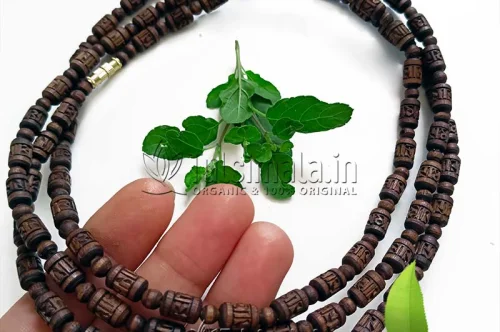Traditional Indian Herbal Plants Tulsi and Its Medicinal Importance

Tulsi Japa Mala from Vrindavan India Shop Now
Another study showed that Tulsi's beneficial effect on blood glucose levels is due to its antioxidant properties. The Rama Tulsi is the effective remedy for the severe acute Respiratory Syndrome. Juice of its leaves gives relief in cold, fever, bronchitis and cough. Tulsi oil is also used as the ear drop. Tulsi helps in curing malaria. It si very effective against indigestion, headache, hysteria, insomnia and cholera. The fresh leaves of Tulsi are taken by the millions of people every day.
For over the centuries Tulsi (the queen of herbs) has been known for its remarkable healing properties. Modern scientific research offers impressive evidence that Tulsi reduces stress, enhances stamina, elieves inflammation, lowers cholesterol, eliminates toxins, protects against radiation, prevents gastric ulcers, lowers fevers, improves digestion and provides a rich supply of antioxidants and other nutrients.
Tulsi is especially effective in supporting the heart, blood vessels, liver and lungs and also regulates blood pressure and blood sugar. Recent studies suggest that Tulsi may be a COX-2 inhibitor, like many modern painkillers, due to its high concentration of ugenol (1-hydroxy-2- methoxy-4-allylbenzene). Tulsi also shows some promise for protection from poisoning and cataracts. The oil extracted from the Karpoora Tulsi is mostly used in the herbal toiletry.
Its oil is also used against the insects and bacteria. Tulsi can not only keep the dreaded Swine flu or H1N1 flu at bay but also help in fast recovery of an afflicted person, Ayurvedic practitioners claim. "The anti-flu property of Tulsi has been discovered by medical experts across the world quite recently. Tulsi improves the body's overall defence mechanism including its ability to fight viral diseases.
INTRODUCTION
Tulsi is considered to be a ubiquitous plant in India. Ocimum tenuiflorum ( tulsi) is an aromatic plant in the family Lamiaceae. It is an erect, much branched sub shrub 30-60 cm tall with hairy stems and simple opposite green leaves that are strongly scented. tulsi plays a vital role in our everyday life and is said to be the queen of herbal plants.
it is the most common household plant in india and it is sacred in hindu tradition. Many Hindu epics explain the mportance, properties and uses of tulsi. Tulsi is an erect sweet scented shrub which grows upto a height of 3 -5 feet. it is commonly grown in gardens and in the periphery of temples. it has got a pungent taste and fragrant smell. it is the only plant that can absorb carbon di oxide through-out its life.
it releases the oxygen in the early morning which is beneficial for the people in breathing dis-orders. Tulsi plant has a lot of significance for mankind, due to the anifold medicinal benefits it provides. Tulsi leaves are widely used in the preparation of Ayurvedic medicines. It is known to promote the longevity of life.
The extracts obtained from the plant are extensively brought to use for curing various diseases such as the common cold, inflammation, malaria, heart disease, headaches, stomach disorders, kidney stones, heart disorders, and many more. The Indian basil Tulsi also aids in the purification of atmosphere. Tulsi plant serves as a fabulous repellant in fighting against flies, mosquitoes and insects. It is especially valuable in combating malarial fever.
It is said that at the time of establishment of Victoria gardens in Bombay (now Mumbai), the workers became victims of mosquito bites and suffered from chronic malaria. Seeing the pitiable situation of the workers, some of the Hindu managers recommended the plantation of Tulsi plant in the garden. On following their advice, fruitful results were obtained. Thus, holy basil Tulsi helped to abate the growth of mosquitoes and control malaria.
There are numerous uses of Tulsi plant. The plant is increasingly finding its way in the Ayurvedic treatment of diseases. Tulsi leaves are widely used due to their healing power. It is a tonic for the nervous system and thus, helps a great deal in sharpening the memory. This aromatic plant supports the removal of phlegm and catarrhal matter from the bronchial tube.
It also works wonders in preventing stomach disorders. The herb Tulsi is known to cure the respiratory disorders. The decoction prepared by mixing honey, ginger and Tulsi leaves is quite helpful in combating bronchitis, influenza and asthma.
The leaves of Tulsi plant are extremely beneficial during the rainy season, when diseases like malaria and dengue victimize the country. Boil the tender leaves of Tulsi in tea and give it to the patient. The juice extracted from Tulsi leaves serves as the best remedy to bring down fever. Tulsi is an essential ingredient in the preparation of Ayurvedic cough syrups. It is highly useful in getting rid of cold and flu.
Even, for sore throat, the leaves of medicinal plant Tulsi is of great value. Just boil the leaves of Tulsi in water and ask the patient to gargle with this decoction. Tulsi has the ability to strengthen the kidneys. For those suffering from the problem of renal kidney stones, the decoction prepared by mixing the juice of Tulsi leaves with honey, if taken sincerely for six consecutive months can oust these stones via the urinary tract.
For maintaining healthy heart, Tulsi is of utmost value. It helps in lowering the level of cholesterol in blood. Thus, Tulsi plant serves as the most effective remedy to combat cardiac diseases.
Note: Buy original tulsi mala by visiting our website www.tulsimala.in or you can click the below links
 English
English Hindi
Hindi








